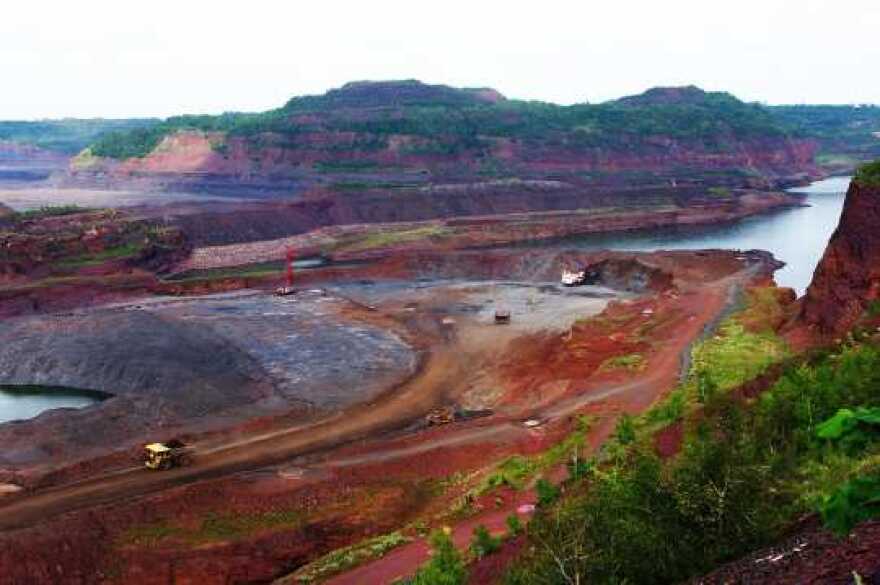EVELETH — The Minnesota Department of Iron Range Resources and Rehabilitation is not just about mining.
The state agency’s work serves 53 cities, 134 townships, 14 school districts and four tribal nations with a stated mission to build and sustain the economy of northeastern Minnesota with tax money collected from taconite production, not state funds.
Funding areas include reliable internet for businesses, schools and individuals in the region as well as new industries like solar, a burgeoning film industry and recreational economic growth like mountain bike trails, among others.
Newly crowned IRRR Commissioner Ida Rukavina joined the KAXE Morning Show to share more about the agency and its impact on the Iron Range as she looks ahead to what she’d like to accomplish in the role.
Appointed by Gov. Tim Walz in December 2022, Rukavina had an extensive career in public policy and politics before taking the helm. That career has included working as Northern Minnesota outreach director for Sen. Amy Klobuchar, as a union leader and as executive director for the Range Association of Municipalities and Schools. Rukavina lives in Pike Township and is the daughter of the late Iron Range lawmaker Tom Rukavina.
"We are proud, very proud, to say that our state, the State of Minnesota, is still providing 85% of this nation’s domestic iron ore."IRRR Commissioner Ida Rukavina
Broadband
The Iron Range has struggled to meet state goals when it comes to internet connectivity, Rukavina said, providing an opportunity to approach funding in a different way.
“We realized quickly that the costs of doing broadband in Northern Minnesota are different than higher populated areas,” Rukavina said. “Sometimes it’s a little bit harder to dig fiber into the ground when there’s hard rock, so it’s just a lot more costly and has taken a long time.”
IRRR works alongside different regional partners while utilizing state and federal grants to work toward higher broadband speeds for business, educational and home needs of the region.
“There are a lot of unserved and underserved populations in townships and rural areas,” she said, “where you might have one person living at the end of a 5-mile road.”
Other investments on the Range
Mining jobs do not represent the only employment opportunities in the region. Traditional industries and employers include health care, schools and manufacturing.
Rukavina pointed out the country’s second largest solar panel production company, Heliene, is in Mountain Iron. Growing in need of employees is All Season Vehicles (ASV) in Grand Rapids, which manufactures compact loaders and skid steers. Bought by Japanese company Yanmar, ASV has almost 180 employees locally on the Iron Range and 18 job openings.
Rukavina also pointed to Detroit Diesel Remanufacturing as a growing business on the Iron Range. It’s described on the IRRR website as a company producing new and remanufactured electronics components for the heavy-duty equipment, truck, passenger vehicle, agriculture, transit and rail industries.
Further economic diversification with IRRR’s investments is in creating a Northern Minnesota film industry.
“Whether we’re encouraging local people to get involved in film or whether we’re trying to attract the film industry to view Northern Minnesota as a wonderful place to film,” she said, “we see the return, whether it’s the workforce side of things or the economic impacts of those film productions.”
Rukavina believes film industries and investments in biking trails are part of the quality of life that may attract new people to the region.
“We love this region and live here for a reason, and we think there’s a lot of hope for the future, and I see that happening,” she said.
State of mining
While the IRRR isn’t all about mining, the funding underpinning its regional investments comes entirely from the taconite industry.
Taconite, or the flint-like rock containing low-grade iron ore, was discovered in 1870, according to the Minnesota Historical Society. Taconite was ignored for years in favor of high-grade iron ore, but in the 1940s, through experimentation at the University of Minnesota, an effective process emerged to make a briquette-like pellet. This created an industry that is still one of the biggest employers of the region.
What is the current state of taconite mining on the Range? Rukavina said it continues to play a key role in not only the local economy, but across the U.S.
“The majority of the mines are up and running and we are continuing to provide iron ore and taconite that produces the nation’s steel,” she said. “And we are proud — very proud — to say that our state, the State of Minnesota, is still providing 85% of this nation’s domestic iron ore.”

The iron mining industry is the nation’s source for cars and appliances and the modern amenities the world has come to rely on, she said.
When asked about the possibility of copper-nickel mining, Rukavina mentioned two projects, Polymet in Hoyt Lakes and Talon Mines in Taconite, as businesses currently working through the permitting process. Copper-nickel mining has been the subject of intense debate, raising environmental concerns with some while others say it is necessary as the demand for precious metals in battery technology increases.
“Copper, nickel, palladium are needed, obviously, in the products that we create and use across the nation and across the world,” Rukavina said, adding if the Polymet and Talon mines open, it will be a similar industry to taconite mining, providing essential elements for the daily products people use like computers and cellphones.
Another proposed project by Chilean company Antofagasta, Twin Metals, was blocked this year by a 20-year mining moratorium from the Biden administration, based on a study from the U.S. Forest Service in January.
Listen to Rukavina’s full KAXE conversation above.










